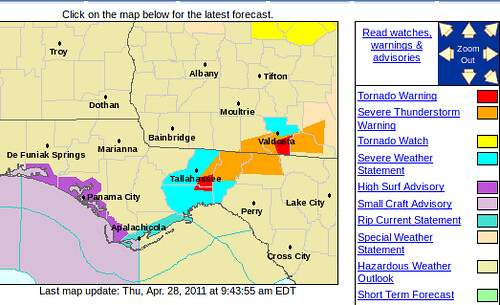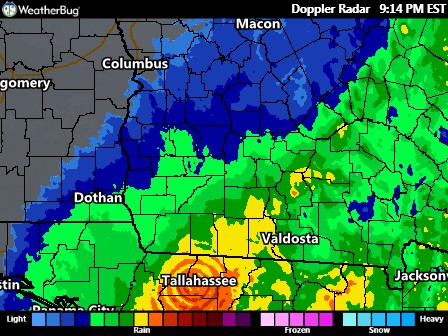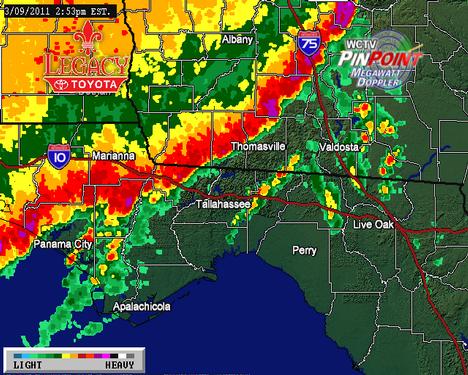This is at least the second time this month; here another tornado warning for Lowndes County, from 5 April 2011: Continue reading
Category Archives: Radio
Frank Barnas @ VCC 7 April 2011
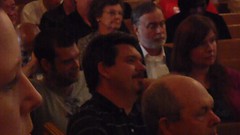 George Boston Rhynes said:
George Boston Rhynes said:
Every time Frank Barnas asks one of you representatives while you all are on that radio broadcast, he gets answers. So many people who come before the city council who have answers don’t get answers.
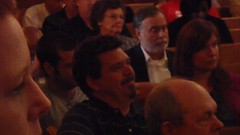 While
George Rhynes was talking
Frank Barnas seemed quite amused by all that.
While
George Rhynes was talking
Frank Barnas seemed quite amused by all that.
Here’s the video:
Frank Barnas @ VCC 7 April 2011
Regular monthly meeting of the Valdosta City Council (VCC),
Valdosta, Lowndes County, Georgia, 7 April 2011,
Videos by Gretchen Quarterman for LAKE, the Lowndes Area Knowledge Exchange.
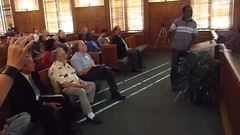 You know, when Roy Taylor
and
George Rhynes,
about as far apart on the political spectrum as two people can get,
think there’s something wrong with your council,
maybe it’s worth thinking about.
You know, when Roy Taylor
and
George Rhynes,
about as far apart on the political spectrum as two people can get,
think there’s something wrong with your council,
maybe it’s worth thinking about.
-jsq
PS: George Rhynes was not one of the people Scott Orenstein was saying don’t stay for the whole meeting; George was the videographer Scott referred to. George stayed even after the meeting was over, and talked to Council Deidra White on the way out of the building.
Is Dixie Alley spreading?
More maps of Dixie Alley from Is Dixie Alley an extension of Tornado Alley? by P. Grady Dixon, et al.: Continue reading
A new tornado alley?
 Just a couple of weeks ago a local elected official told me
“we didn’t live in tornado alley”.
Well, after
today’s storm
in which
apparently there were some tornados to the west before it got here,
the Washington Post remarks on
Mardi Gras storm risk & the new tornado alley:
Just a couple of weeks ago a local elected official told me
“we didn’t live in tornado alley”.
Well, after
today’s storm
in which
apparently there were some tornados to the west before it got here,
the Washington Post remarks on
Mardi Gras storm risk & the new tornado alley:
Despite the lack of historic twister activity around New Orleans, tornado climatology indicates they become much more common due north into south central Mississippi and expanding northeast and northwest from northern Alabama across northern Louisiana, southwest Tennessee and into eastern Arkansas.As you can see by the map they posted from a recent study, one pocket of this new tornado alley, nicknamed Dixie Alley, is in south Georgia.
The article goes on to quote a different study that said:
…Dixie Alley has the highest frequency of long-track F3 to F5 tornadoes, making it the most active region in the United States. … Based on this analysis, colloquial tornado alley fails to represent the areas of highest activity in the United States, indicating that a more comprehensive analysis of additional tornado alleys in the United States by the NWS may be needed in the future.So yes, we do live in the new tornado alley.
Sure would be nice for people around here to have NOAA Weather Radios.
-jsq
PS: Nothing but wind and rain on my hill. This time.
Tornado warning: you would have heard this on NOAA Weather Radio
The red line is severe weather heading this way fast:
WCTV reports Tornado Watch: Severe Weather Expected Throughout Fla. Panhandle: Continue reading
NOAA Weather Radios needed on the edge of the county –John S. Quarterman
 So I’ll give you my opinion, like I gave it to the County Commission,
and at the end of this post there’s a chronological list of links to
all the NOAA Weather Radio posts so far.
So I’ll give you my opinion, like I gave it to the County Commission,
and at the end of this post there’s a chronological list of links to
all the NOAA Weather Radio posts so far.
But first, what do these radios do? According to NOAA:
NWR is an “All Hazards” radio network, making it your single source for comprehensive weather and emergency information. In conjunction with Federal, State, and Local Emergency Managers and other public officials, NWR also broadcasts warning and post-event information for all types of hazards – including natural (such as earthquakes or avalanches), environmental (such as chemical releases or oil spills), and public safety (such as AMBER alerts or 911 Telephone outages).So these radios provide all the types of information J.L. Clark referred to. There’s more information in that NOAA web page.
I spoke after J.L. Clark on 22 Feb 2011. There is no video, because LAKE had only one camera at that meeting. From memory, here is the gist of what I said.
I live out on the edge of the county. I remember when Ashley Paulk moved in next door.Continue reading
NOAA Weather Radios: “think before you act” –J.L. Clark, LCC, 22 Feb 2011
 The week after Commissioner Raines
said NOAA Weather Radios were “wasteful spending”
and the commission voted 2:1 against them,
J.L. Clark asked the Commission to “think before you act”.
The week after Commissioner Raines
said NOAA Weather Radios were “wasteful spending”
and the commission voted 2:1 against them,
J.L. Clark asked the Commission to “think before you act”.
Clark pointed out that nobody said anything when the state effectively raised property taxes. He read off a list of other grants the county has accepted, and asked:
Are you going to return those grants? I think not.He brought up a recent earthquake and pointed out those radios would be quite useful in such a natural disaster.
I ask the Commissioners to think before you act, and not to react to you-know-what.The commissioners made no response. Here’s the video:
Video by John S. Quarterman for LAKE, the Lowndes Area Knowledge Exchange.
-jsq
NOAA Weather Radios “wasteful spending” –Richard Raines
 Are NOAA Weather Radios “wasteful spending”?
Are NOAA Weather Radios “wasteful spending”?
We’ve already seen staff present the case for about 5,000 NOAA Weather Radios at $21.50 each, paid for out of grant money. They made that case at the 8:30AM 7 Feb 2011 Lowndes County Commission Work Session.
 At the regular session the next day (5:30 PM Tuesday 8 Feb 2011),
citizen Nolen Cox spoke against the NOAA grant and more generally said
“just say no to grants”.
He also went on at some length about how he didn’t believe in climate change.
Nevermind that the fifth U.S. or British board of inquiry has
reconfirmed yet again that the data and analysis for climate change
are solid.
At the regular session the next day (5:30 PM Tuesday 8 Feb 2011),
citizen Nolen Cox spoke against the NOAA grant and more generally said
“just say no to grants”.
He also went on at some length about how he didn’t believe in climate change.
Nevermind that the fifth U.S. or British board of inquiry has
reconfirmed yet again that the data and analysis for climate change
are solid.
 EMA Director Ashley Tye summarized the case for NOAA Weather radios,
according to the minutes,
EMA Director Ashley Tye summarized the case for NOAA Weather radios,
according to the minutes,
stating Lowndes County had been awarded $107,500.00, in Hazard Mitigation grant funding for the purchase of 5,000 NOAA weather radios to benefit all of Lowndes County. Mr. Tye added that Alert Works had presented the low bid in the amount of $21.50 per radio.Finally, the Commission had some discussion. According to the minutes: Continue reading
NOAA Weather Radios, LCC, 7 Feb 2011
 We’ve already heard about NOAA Weather Radios from two different citizens,
Nolen Cox
and Ken Klanicki.
What are they talking about?
As usual, much of the discussion was in the work session
(8:30 AM Monday 7 Feb 2011), available here in two parts.
We’ve already heard about NOAA Weather Radios from two different citizens,
Nolen Cox
and Ken Klanicki.
What are they talking about?
As usual, much of the discussion was in the work session
(8:30 AM Monday 7 Feb 2011), available here in two parts.
In Part 1 staff talks about buying about 5,000 NOAA weather radios so the citizens can get weather news. Low bidder would charge $21.50 per radio.
Videos by Gretchen Quarterman and John S. Quarterman
for LAKE, the Lowndes Area Knowledge Exchange.
In Part 2, staff notes that the grant would require that the radios can’t be earmarked, so people could come to the county office to pick up radios, and staff proposes to have several community events throughout the community, well-advertised, for people to pick up radios and staff to answer questions about them.
One of the commissioners notes:
That’s almost $108,000 tax money what happens to that grant money if, we say you know, it might not be a good idea […] what happens to that?Continue reading
“the learning curve is very steep” –Ken Klanicki
Continue readingFormer Lowndes County commissioner Richard Lee once told me “…the learning curve is very steep for first-time commissioners.” Our new county commissioners, Richard Raines and Crawford Powell, are living proof of the veracity of that statement. In case Bill O’Reilly is reading this, here’s a few examples.
Earlier this month a grant application for the purchase of 5,000 weather emergency radios was nixed by a 2 – 1 vote. The radios could’ve been a means for citizens residing in remote areas of the county to
